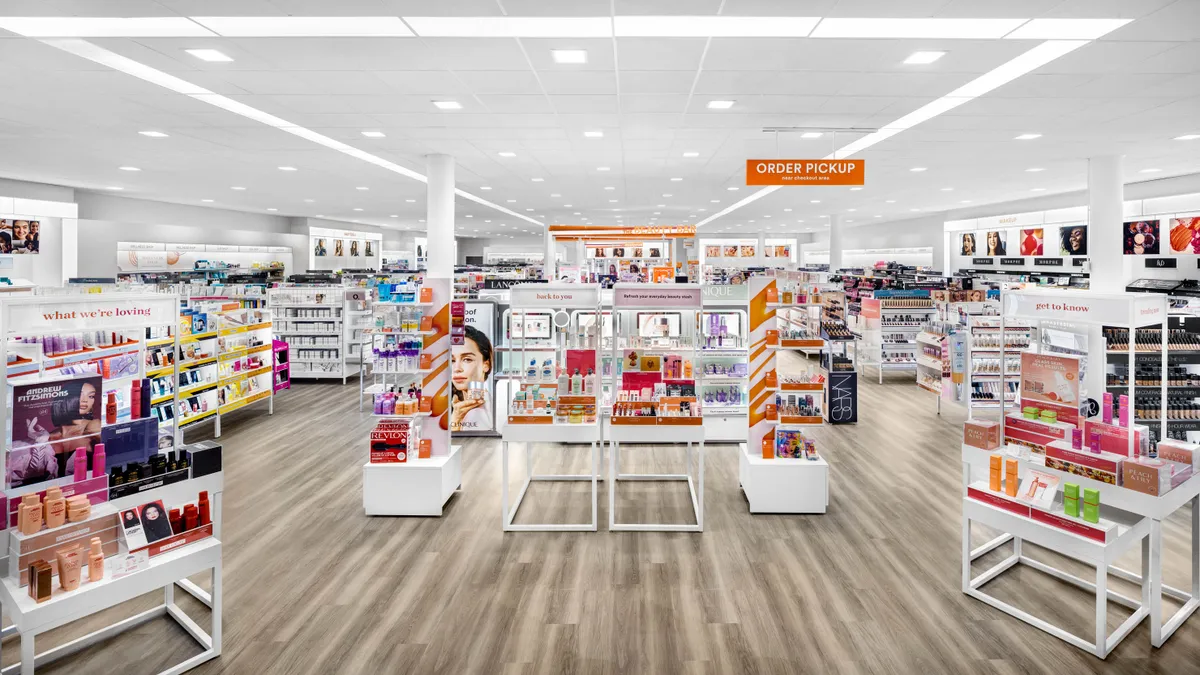Dive Brief:
- Rounding out a strong year, Ulta Beauty saw fourth-quarter net sales increase 18.2% year over year to $3.2 billion compared to $2.7 billion during the same period last year, according to a Thursday press release. The increase was in part due to retail price increases, new brands and product innovation. Comps were up 15.6% for the quarter compared to 21.4% in 2021.
- The beauty retailer’s net income increased 17.8% to $340.8 million compared to $289.4 million, while operating income increased 19.2% to $447.6 million, per the release.
- For the full-year, net sales increased 18.3% to $10.2 billion compared to $8.6 billion in 2021, and comps rose 15.6% compared to 37.9%. Meanwhile, operating income jumped 26.3% to $1.6 billion.
Dive Insight:
Ulta’s fiscal year concluded with several new records for the retailer.
“Ulta Beauty’s strong fourth quarter results punctuate an exceptional year with record sales, profitability, and member growth, reflecting robust demand and best-in-class execution,” Dave Kimbell, chief executive officer, said in a statement. “For the first time in our 33-year history, Ulta Beauty’s annual revenue surpassed ten billion dollars, our annual net income exceeded one billion dollars, and we exceeded 40 million Ultamate Rewards members. These milestone achievements demonstrate the power of Ulta Beauty’s highly differentiated model, the health of the growing beauty category, and our winning culture and outstanding teams.”
On a call with analysts Thursday, Kimbell said Ulta’s shop-in-shop partnership with mass retailer Target continued to grow during the year with the opening of 254 additional locations. As for new stores in the long term, Chief Financial Officer Scott Settersten told analysts its outlook anticipates 1,500 to 1,700 stores with about 800 Ulta Beauty at Target locations in addition to that.
Shrink seemed to be heightened for the quarter and full year at Ulta. In Q4, higher shrink partially impacted the company’s gross margin, which was flat year over year. For the full year, gross margin was only slightly higher at 39.6% compared to 39%, partially due to higher inventory shrink.
“Like you're hearing from the broader retail industry, organized retail crime and shrink is a real issue out there, and we're not immune to what's happening,” Kecia Steelman, chief operating officer, told analysts. To combat this issue, the company has been investing more in deterrents such as locked fragrance cabinets, which Steelman said have helped shrink decrease while sales increase.
Kimbell on Thursday said the company saw double-digit growth across all major categories, with skin care being the fastest growing. The chief executive said there are strong trends rooted in wellness and self-care which will continue to drive the categories in 2023.
The connection between beauty and wellness is a trend that’s benefiting many in the industry right now, according to GlobalData Managing Director Neil Saunders.
“One of the factors underpinning beauty’s success is the fact many people see it as a very important indulgence that makes them feel good or gives them confidence,” Saunders said in emailed comments. “Beauty is no longer a category that is just about adding a bit of color to a complexion. It is now concerned with health, vitality and wellbeing and with helping consumers remedy problems with skin, hair and other things.”
That said, Ulta has been proactive in taking advantage of this trend, according to Saunders, by becoming a more competitive player in the field with new offerings across various price points.
The company’s outlook for the next year is more conservative than its latest growth, expecting to see net sales reach between $10.95 billion to $11.05 billion, and comps up 4% to 5%. However, this is more so a normalization for the company following a period of strong growth, according to Saunders.
















